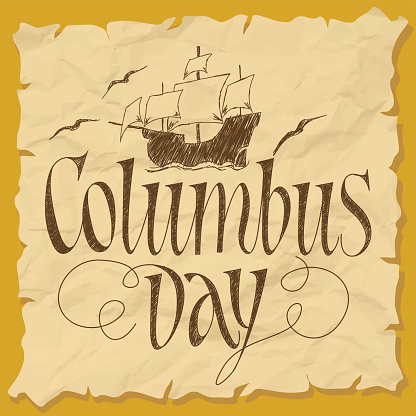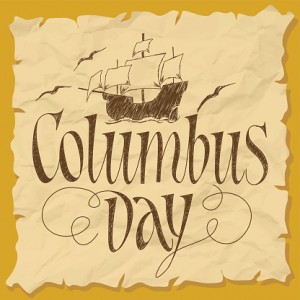By Mark Bowles, Ph.D.
Faculty member, History at American Public University
Imagine what it was like on the night of October 11, 1492. Christopher Columbus strode across his ship the Santa Maria, sailing upon the formidable waves of the Atlantic Ocean. In the distance, he kept telling himself he could see a light.
As darkness settled in, a man from the Pinta’s lookout perch excitedly called out that he sighted land. The next day, Columbus led a small boat to the shores of what is now called the Bahamas. It was a significant day that ignited revolutionary change.
As a historian, I may have a different take on Columbus Day than casual celebrants of this holiday. Some might have the day off work, while others attend a parade or a cultural event. These typically celebrate the significance of the voyage as its landing place, and the so-called “discovery” of the Americas.
Others point to Columbus’ importance as establishing permanent settlements and initiating colonization of the New World. Scholars who devote their lives to understanding the impact of the Columbus landing over time call this the “Columbian Exchange.”
Alfred Crosby wrote one of the classic books on the Columbian Exchange in the early 1970s, The Columbian Exchange Biological and Cultural Consequences of 1492. His argument was that the voyages of Columbus were more significant for biological reasons than for social or political change. As a result, Crosby helped begin the specialization of environmental history. He wrote: On October 12, 1492 “the two worlds, which God had cast asunder, were re-united, and the two worlds, which were so very different, began on that day to become alike.”
While significant, this did not uneventfully pave the way for the eventual emergence of the United States, as we sometimes tell schoolchildren. In his book, Americas: The Changing Face of Latin America and the Caribbean, Peter Winn wrote that European diseases carried to the New World resulted in the “greatest demographic disaster in history.”
Measles, smallpox, and plague devastated the isolated and indigenous population with no immunities to the European diseases. The consequence was that the “Caribbean became a virtual tabula rasa upon which a European imperial design could be described.” The legacy took the shape of a plantation society, powered by enslaved Africans.
While everything from parades to biological disaster and slavery are valid meanings associated with Columbus Day, I prefer to focus on an entirely different aspect—the journey. We should not overlook that Columbus and his crew crossed an ocean, and this voyage (regardless of the consequences you associate with it) is a defining trait of what it means to be a human being.
I was reminded of this as I spent the last year writing a book, Just Keep Rowing, with Katie Spotz. Hers is a remarkable story of adventure. In 2010, she left the shores of Africa, entirely alone, crowded with her food and supplies upon a 19-foot rowboat. Seventy days later, she completed a 3,000 mile journey across the Atlantic Ocean and landed in South America. Over one million oar strokes, combined with an indomitable spirit, enabled her to become the youngest person (at age 22) to ever row across an ocean.
Interestingly, Katie and Christopher have something in common beyond crossing an ocean. Columbus set sail from Spain on August 3, 1492 and eventually reached land on October 12. Katie began her journey from Dakar, Senegal on January 3, 2010 and reached Guyana, South Africa on March 14, 2010. Ironically, both of these trips lasted exactly 70 days.
Katie’s story is important because transoceanic voyages are in our DNA. Other than Native Americans whose forbearers came here across the Bering Land Bridge, the rest of us owe our existence in North America to an ancestor who crossed an ocean. Either via the great sailing ships like the Mayflower, the tragic voyages of the slave ships like the Amistad, or the crowded immigrant steamships, we have in our lineage someone who crossed an ocean. We should never forget this.
In Just Keep Rowing, we use crossing an ocean as a metaphor for the seemingly insurmountable obstacles we all have in our lives. Your ocean might be the loss of a loved one, the challenges of getting an education, the struggle to overcome an addiction, problems on the job, or the pain of ill health. Whatever your ocean might be, it is in our nature to strive to overcome and reach the other side.
Passions for the unknown and adventure leads us to not simply climb mountains or go to the moon, but also to raise families and survive in a challenging world. Columbus’ journey, as does Katie’s, reminds us of the faith and courage of the human spirit that brought us to these United States and continues to propel us forward today.
In my opinion, this is the true meaning of Columbus Day.
About the Author: Mark Bowles is Professor of History at American Public University System. To learn more about his latest book visit JustKeepRowing.com or visit his website ProfessorMDB.com.


Comments are closed.